

Thesis. A thesis or dissertation[1] is a document submitted in support of candidature for an academic degree or professional qualification presenting the author's research and findings.[2] In some contexts, the word "thesis" or a cognate is used for part of a bachelor's or master's course, while "dissertation" is normally applied to a doctorate, while in others, the reverse is true.[3] Dissertations and theses may be considered as grey literature.
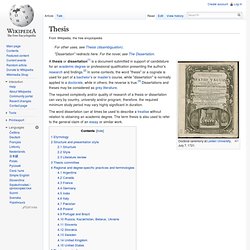
The required complexity and/or quality of research of a thesis or dissertation can vary by country, university and/or program, therefore, the required minimum study period may vary highly significant in duration. The word dissertation can at times be used to describe a treatise without relation to obtaining an academic degree. The term thesis is also used to refer to the general claim of an essay or similar work. Etymology[edit] The term "thesis" comes from the Greek θέσις, meaning "something put forth", and refers to an intellectual proposition. Abstract (summary) An abstract is a brief summary of a research article, thesis, review, conference proceeding or any in-depth analysis of a particular subject or discipline, and is often used to help the reader quickly ascertain the paper's purpose.[1] When used, an abstract always appears at the beginning of a manuscript or typescript, acting as the point-of-entry for any given academic paper or patent application.
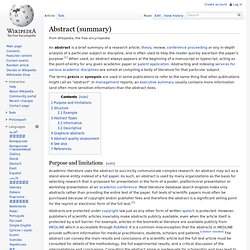
Abstracting and indexing services for various academic disciplines are aimed at compiling a body of literature for that particular subject. How to Write an Abstract. An abstract condenses a longer piece of writing while highlighting its major points, concisely describing the content and scope of the writing, and reviewing the content in (very) abbreviated form.

A research abstract concisely states the major elements of a research project. It states: purpose, methods, and findings of the research. Writing a good abstract requires that you explain what you did and found in simple, direct language so readers can then decide whether to read the longer piece of writing for details. WhiteSmoke software can use its writing enrichment features to check your vocabulary and suggest more precise words. Its online dictionary and thesaurus software will further help you refine the language so that each word says exactly what you need it to say. The audience for an abstract should be broad--from expert to lay person. Here's how to write an abstract: What are you researching (what's the question you're asking)? The title of the paper. Paper title. 5. 6. 2.)
Research. Basrelief sculpture "Research holding the torch of knowledge" (1896) by Olin Levi Warner.
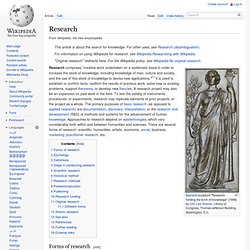
Pure research. Basic research (also called pure research or fundamental research) is a systematic study directed toward greater knowledge or understanding of the fundamental aspects of phenomena without specific applications or products in mind.
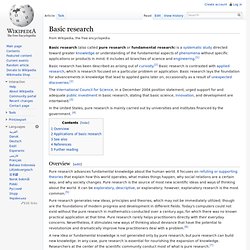
It includes all branches of science and engineering.[1] Applied research. Applied research deals with solving practical problems[2] and generally employs empirical methodologies.
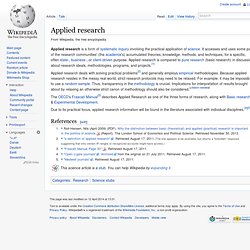
Because applied research resides in the messy real world, strict research protocols may need to be relaxed. For example, it may be impossible to use a random sample. Thus, transparency in the methodology is crucial. Implications for interpretation of results brought about by relaxing an otherwise strict canon of methodology should also be considered. Empirical. Empirical evidence (also empirical data, sense experience, empirical knowledge, or the a posteriori) is a source of knowledge acquired by means of observation or experimentation.[1] Empirical evidence is information that justifies a belief in the truth or falsity of an empirical claim.
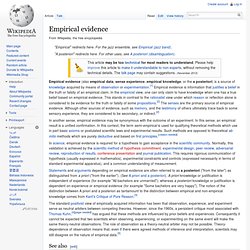
In the empiricist view, one can only claim to have knowledge when one has a true belief based on empirical evidence. This stands in contrast to the rationalist view under which reason or reflection alone is considered to be evidence for the truth or falsity of some propositions.[2] The senses are the primary source of empirical evidence. Although other sources of evidence, such as memory, and the testimony of others ultimately trace back to some sensory experience, they are considered to be secondary, or indirect.[2] In another sense, empirical evidence may be synonymous with the outcome of an experiment. In this sense, an empirical result is a unified confirmation. See also[edit] Constructive research. Constructive research is perhaps the most common computer science research method.
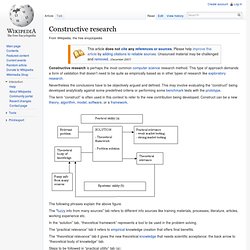
This type of approach demands a form of validation that doesn’t need to be quite as empirically based as in other types of research like exploratory research. The term “construct” is often used in this context to refer to the new contribution being developed. Construct can be a new theory, algorithm, model, software, or a framework. The following phrases explain the above figure. The "fuzzy info from many sources" tab refers to different info sources like training materials, processes, literature, articles, working experience etc.
Exploratory research. Exploratory research is research conducted for a problem that has not been clearly defined.
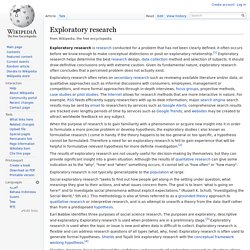
It often occurs before we know enough to make conceptual distinctions or posit an explanatory relationship.[1] Exploratory research helps determine the best research design, data collection method and selection of subjects. It should draw definitive conclusions only with extreme caution. Given its fundamental nature, exploratory research often concludes that a perceived problem does not actually exist.